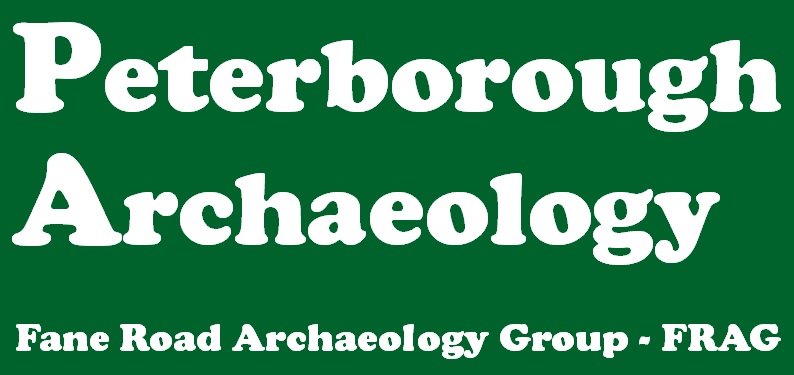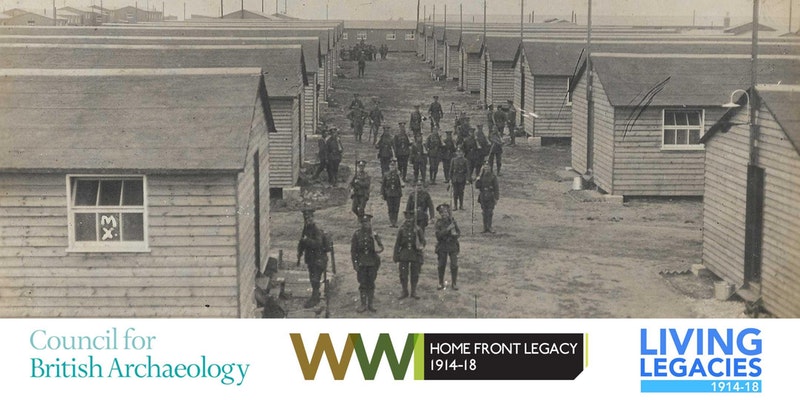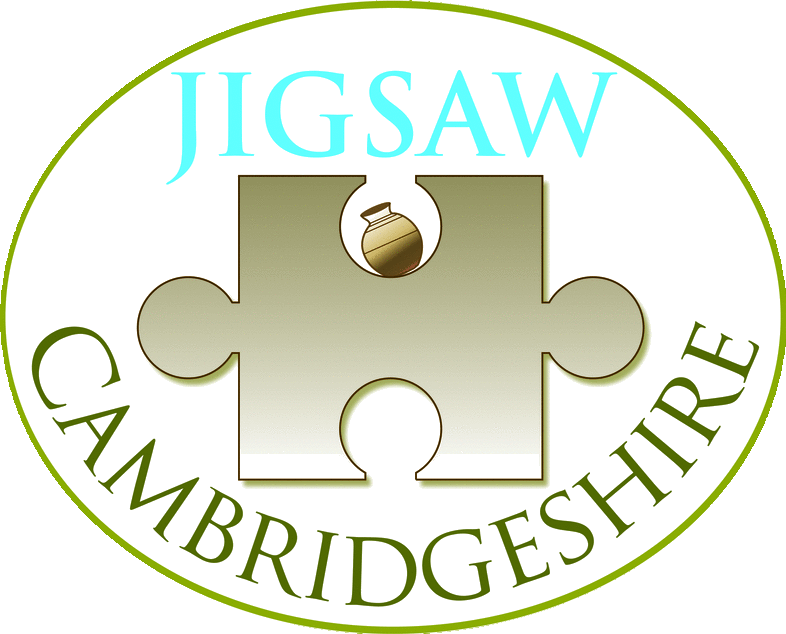News
- Details
- Written by Jigsaw
We're extending a very warm welcome to the Fane Road Archaeology Group (FRAG) who have officially affiliated to the Jigsaw network of local archaeology and history groups. This is a Peterborough-based community archaeology group, and the first based outside Cambridgeshire to join our network. The Heritage Lottery Funded term of the project was only for groups within the modern county of Cambridgeshire but we are now in a position to to affiliate groups beyond this area. The Oakington and Westwick History Society also affiliated to Jigsaw earlier in 2017 and so we continue to grow the popularity and reach of our network.
The Fane Road Archaeology Group developed out of the community excavation of a Roman villa in 2014 in Peterborough as part of a Heritage Lottery Funded project in partnership with Oxford Archaeology East, and the group have continued to undertake excavation at the site during the summer months. FRAG's next workshop takes place on Wednesday 6th December at 7pm at The Parkway Sports & Social Club on Maskew Avenue in Peterborough. Paul Clarkson will be leading a workshop on how to examine archaeological animal bones to identify, measure and age them.
FRAG have a website covering upcoming events in the Peterborough area and a lot of background information about the area's archaeology: https://peterborougharchaeology.org/
If you are interested in affiliating your existing archaeology or history society (in Cambridgeshire or a neighbouring county) or finding out how to set up a new group, please contact us for more information.

- Details
- Written by Jigsaw
Cambridge Archaeology Field Group - Monthly Talk
'Vela Spila (Croatia) fieldwork - making archaeology meaningful to the community' by Patricia Duff
Wednesday 1st November 2017 at 7:30pm
McDonald Institute for Archaeological Research, Downing site, Cambridge
All welcome (CAFG invite contributions of £1 from non-members)
St Neots Local History Society - Talk
'The Archaeological Excavations at Little End, Eaton Socon' by Jonathan House (Pre-Construct Archaeology)
Friday 3rd November 2017 at 7:30pm
Eyenesbury Junior School, Montagu St, Eynesbury, Saint Neots PE19 2TD
Now that the dust has settled after the excavation, and Lidl’s Eaton Socon store has opened its doors, this is a chance to hear more about what the archaeologists found on the site before the store was built. 8000 years of history in a one hour talk!
All welcome (Members: Free; Non-members: £2.50)
Cambridge Antiquarian Society - Monthly Talk
'Sicily in transition: exploring the archaeology of regime change' by Martin Carver
Monday 6th November 2017 at 6:00pm
Faculty of Law, West Road, Sidgwick Site, University of Cambridge
There is no charge for visitors or guests at lectures. New members are warmly welcomed.
Histon and Impington Archaeology Group - Monthly Talk
'Anglo-Saxon Swords of Cambridgeshire' by Denis Sami (Oxford Archaeology East)
Monday 13th November 2017 at 7:30pm
Histon Baptist Church, 2 Poplar Rd, Histon, Cambridge CB24 9LN
Open to all. Members £2 and visitors £3, accompanied children free. Open evenings: free to all. Refreshments available.
Oakington & Westwick History Society - Monthly Talk
'The World of Sundials' by Mike Cowham
Thursday 16th November 2017 at 7:30pm
St Andrews Church Hall, High Street, Oakington, CB24 3AG
Mike Cowham will be giving a talk on the world of sundials, including local examples. Mike was a founding member of The British Sundial Society founded in 1989. He is still an active member and has written a number of books on the subject, which will be available to buy on the night.
Free to members, a charge of £4 for non-members
Cambridge Antiquarian Society - Conference
Saturday 18th November 2017
Law Faculty building, West Road, Cambridge
The Cambridge Antiquarian Society's Autumn Conference and Exhibition generally focuses on recent archaeological work in Cambridgeshire and presents an unusual opportunity to discuss local archaeology with the archaeologists.
More information will be available on the CAS website in due course: http://www.camantsoc.org/conf.html
FenArch - Monthly Talk
'Tunnels under Wisbech' by Andy Ketley
Wednesday 22nd November 2017 at 7:30pm
Mendi's Restaurant, 21 Old Market Place, Wisbech, PE13 1NB
Members of the public are welcome to attend. Entry is £2 for non-members.
Fen Edge Archaeology Group - Monthly Talk
'Human Osteoarchaeology in Cambridgeshire' by Natasha Dodwell (Oxford Archaeology East)
Thursday 23rd November 2017 at 7:30pm (doors open 7:15pm)
Tony Cooper Suite, Cottenham Village College, High St, Cottenham, Cambridge CB24 8UA
Speaker meeting open to everyone. Admission: Members £2; Non-members pay £3.
Natasha was the senior osteoarchaeologist at the Cambridge Archaeological Unit for 20 years before starting work with Oxford Archaeology in 2016 as Finds and Environmental Manager. She has an extensive knowledge of the archaeology of Eastern England, particularly of burial archaeology, and has studied and contributed to numerous publications on assemblages both small and large from all periods.
- Details
- Written by Jigsaw
'Cheddars Lane Pumping Station' by Alan Denney
Friday 1st September 2017 at 7:30pm
Eyenesbury Junior School, Montagu St, Eynesbury, Saint Neots PE19 2TD
In the Victorian era the population of Cambridge surged, with businesses and housing, plus the University growing. All waste of every kind was disposed of directly into the River Cam and the terrible stench and state of the river was noticed by everyone. Not only did it cause discomfort to breathing, it also spread diseases, such as typhoid and cholera. This is the story of the former Cheddars Lane Pumping Station* and the innovative way in which the city eventually dealt with its waste in the Victorian period.
*now Cambridge Museum of Technology
All welcome (Members: Free; Non-members: £2.50)
Thursday 7th - Sunday 10th September 2017
https://www.heritageopendays.org.uk/visiting/map-search/eastern
Every September some 40,000 volunteers across England organise 5,000 events to celebrate our fantastic history and culture. It's a chance to see hidden places and try out new experiences – all of which are FREE to explore.
Bring Your High Street Photos
Saturday 9th September 2017, 10am - 4pm
Wisbech & Fenland Museum
http://www.highstreetwisbech.org.uk/?event=heritage-open-day-bring-high-st-photos
Bring your High-Street photos, share your stories and find out the latest update on the Wisbech Town Regeneration. Wisbech High Street Townscape Heritage Officer Taleyna Fletcher will talk about the Wisbech High Street Project, the community activities planned, and present slideshows.
‘Hidden Lives: a story of discovery’ – exhibition, tour and talk at the Cultural Zone, Wellcome Genome Campus, Hinxton CB10 1SA
Saturday 16th September 2017
Please book asap and by Saturday 9 September to be sure of joining the group.
http://publicengagement.wellcomegenomecampus.org/events/hidden-lives-story-discovery
The visit takes place on one of the Genome Campus regular Open Saturdays. You can view the exhibition between 12:00 and 14:30. There will also be the chance to join a tour of the research facilities (tours generally take place at 12.15 and 13.15). This is a chance to learn about the study of DNA which is being used more and more to help answer questions from archaeology and prehistory. At 15:00, there will be a talk by Rebecca Gilmore, the exhibition curator, arranged especially for FEAG members. We may also be joined by one of the project scientists.
The exhibition features archaeological artefacts discovered by Oxford Archaeology East at the Wellcome Genome Campus, including ancient human remains, some of which have had their genome sequenced. Developed in partnership with campus scientists and archaeologists, the exhibition explores what we can discover about the past from the things left behind, and how archaeology and DNA analysis can be used to help us better understand our past but also more about ourselves.
Huntingdonshire's Heritage: The Story So Far
The Broadway, St Ives, Cambridgeshire, PE27 5BX
Open until Saturday 23rd December 2017, Monday to Saturday 10am to 4pm, Sunday 1pm to 4pm
An exhibition taking you behind the hoardings to see how the museum's redevelopment has progressed over the last 18 months.
- Details
- Written by Clemency Cooper
'Vela Spila (Croatia) – a brief introduction to recent fieldwork' by Preston Miracle (McDonald Institute for Archaeological Research)
Wednesday 4th October at 7:30pm
McDonald Institute for Archaeological Research, Downing site, Cambridge
All welcome (CAFG invite contributions of £1 from non-members)
Vela spila Cave (Korcula, Croatia), preserves a long, rich, high-resolution record of palaeoenvironmental and archaeological remains in the Adriatic region. Its deposits span from the Last Glacial Maximum (ca. 20 kyr) to the Bronze Age (ca. 3 kyr). In this talk we focus on Late Upper Palaeolithic, Mesolithic and Neolithic assemblages. During the late glacial period Late Upper Palaeolithic people seasonally visited Vela spila to process and consume large game animals (e.g. red deer, European ass, wild cattle) that they hunted on the exposed Great Adriatic Plain. Raw materials for the production of stone tools and shell beads were also procured some distance from the cave; groups had large annual ranges. Starting around 17.5 kyr people developed the technology of firing clay into ceramic, zoomorphic 'figurines'; this technology was used until about 15 kyr. Human activities at Vela Spila changed significantly after the deposition of the Neapolitan Yellow Tuff (NYT, c. 14.3-13.9 kyr) shortly after the onset of rapid, late-glacial warming (GI-1d, starting c. 14.7 kyr). Immediately after the deposition of the NYT the Pleistocene ceramics disappear, the intensity of site visits drops significantly, and the cave was abandoned. After a break in occupation for about 5 kyr, Mesolithic people revisited the cave during the Holocene starting about 9.5 kyr. Rising sea levels had a dramatic impact on Vela Spila’s Mesolithic inhabitants; roe deer, fox, fish, and shellfish dominate the food waste and only locally-available raw materials were used to make stone tools and shell beads. Over the course of the Mesolithic occupation, the human use of subsistence resources intensified. The 8.2 kyr event is roughly correlated with the first appearance of Neolithic technologies (domestic animals followed by pottery) at the site. The archaeological assemblages display aspects of both continuity and change across the Mesolithic-Neolithic transition. With the adoption of food production in the Neolithic, Vela spila was used primarily as a pen for keeping domestic sheep and goat.
'The Archaeology of the Fenland River Ouse' by Chris Evans (Cambridge Archaeological Unit)
Wednesday 4th October 2017 at 7:30pm (doors open 7:15pm)
Willingham Baptist Church Hall, George Street, Willingham, CB24 5LJ
Speaker meeting open to everyone. Admission: Members £2; Non-members pay £3.
Christopher Evans is joint founder and Director of the Cambridge Archaeological Unit. He has worked in British archaeology at a senior level for more than 25 years. He has published widely, including many reports of excavations in Cambridgeshire. He has, in addition, directed a number of overseas fieldwork projects (Nepal, China & Cape Verde), and is a Fellow of the Society of Antiquaries of London and a member of the Institute of Field Archaeologists.
The Council for British Archaeology’s Home Front Legacy team in partnership with the Arts and Humanities Research Council Living Legacies First World War Engagement Centre are hosting two free community workshops to explore how to research, record and fund your own First World War project.
This is aimed at county and local history and archaeology societies, YAC branch leaders and HER Officers interested in learning how to research, record and get funding for their own First World War projects.
For more information and to book a free place on the workshop, visit the Eventbrite page: https://www.eventbrite.co.uk/e/cba-and-living-legacies-first-world-war-workshop-iwm-duxford-tickets-36606317481?dm_i=10MV%2C52MT2%2CK5B9UG%2CJH97T%2C1
Wonderful Wandlebury - History and Archaeology Fun Day
Wandlebury's popular, fun filled family history and archaeology day. Iron Age activities for children – including making rope and using natural stains with the Cambridge Young Archaeologists, simple weaving or basic basket making techniques, cooking over an open fire or making chainmail. There will also be chances to try your hand at archery, use a slingshot and make your own stick bow and arrow to take home.
Perhaps you’ll prefer to meet some of our local archaeologists and find out about their areas of expertise, go on a guided tour of our Iron Age hillfort, follow self-guided historic trails, listen to stories told by the Cambridge Storytellers or even check out beekeeping with the Cambridge Beekeepers.
Events and activities will be held across the Paddock, Ring, Orchard and Stable Rooms.
Entry is free to this popular event but there will be a small charge for selected activities. There will also be opportunities to buy some items.
For more information, visit the Cambridge Past Present Future website: www.cambridgeppf.org/events/wonderful-wandlebury/
'The origins and development of medieval Cambridge and the nearby villages' by Craig Cessford (Cambridge Archaeological Unit)
Monday 9th October at 7:30pm
Histon Baptist Church, 2 Poplar Rd, Histon, Cambridge CB24 9LN
Open to all. Members £2 and visitors £3, accompanied children free. Open evenings: free to all. Refreshments available.
'The Role of Causewayed Enclosures in late Neolithic' by Phil Hill
Wednesday 25th October 2017 at 7:30pm
Mendi's Restaurant, 21 Old Market Place, Wisbech, PE13 1NB
These causewayed enclosures are among the most enigmatic of all archaeological features. Despite the fact that they are found all over continental Europe we know very little about their actual purpose. Phil will explore the theory that perhaps 'ritual' is the only word that can describe the deposits found within them!
Members of the public are welcome to attend. Entry is £2 for non-members.
16th - 29th October 2017
2017 marks the tenth year of the Festival of Ideas. With hundreds of free events over two weeks, the Cambridge Festival of Ideas is one of the most exciting and dynamic occasions in the Cambridge cultural calendar. The Festival includes debates, workshops, talks, exhibitions and performances, celebrating the arts, humanities and social sciences. Featuring researchers from the University of Cambridge, local public figures and renowned guests, the Festival has something for everyone.
http://www.festivalofideas.cam.ac.uk/
We have a new Jigsaw Cambridgeshire group to facilitate discussion and contact between members of Jigsaw affiliated groups and other interested in the archaeology of Cambridgeshire and neighbouring counties. Please request to join the group and an administrator will approve your request as soon as possible. We look forward to hearing more about community archaeology activities, events and discussions from you in the group: https://www.facebook.com/groups/1947436335533549/
- Details
- Written by Jigsaw
The Council for British Archaeology’s Home Front Legacy team in partnership with the Arts and Humanities Research Council Living Legacies First World War Engagement Centre are hosting a free community workshop in Cambridgeshire outlining how to research, record and fund your own First World War project. The workshop takes place on Friday 6th October 2017 at the Imperial War Museum, Duxford. It is aimed at county and local archaeology and history societies, leaders from CBA’s Young Archaeologists’ Club branches, CBA regional groups and existing and emerging First World War community projects funded through the Heritage Lottery Fund or through the Arts and Humanities Research Council First World War Engagement Centres.
Places are limited so booking is essential using the Eventbrite link here: https://www.eventbrite.co.uk/e/cba-and-living-legacies-first-world-war-workshop-iwm-duxford-tickets-36606317481?dm_i=10MV%2C52MT2%2CK5B9UG%2CJH97T%2C1
During the workshops, there will be the opportunity to learn how to use the Home Front Legacy recording app to create new knowledge about the legacy of the First World War in your local area. You will also be introduced to the Home Front Legacy’s range of learning resources for young people. Help and advice will be available to help you set up your own First World War community project with guidance on funding available from the Heritage Lottery Fund and how you can apply, while representatives from existing First World War projects will provide inspiration by sharing their experiences.




